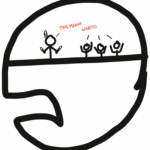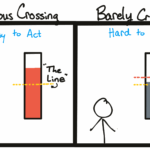Learning
- A developed self-awareness and accurate self-evaluation (you must know where you are to take the best guess at where your next steps should go)
- How to reflect properly (the meta-skill of learning and growth)
- How to learn at maximum capacity (prestudy, SIR, reflection cycles, mindmapping)
- How to fail faster and better (a poor relationship with failure can be quite limiting)
- How to keep a spirit of playfulness (don’t let the world beat this out of you. It’s important.)
- How to enter Flow (challenge-skill ratio, uni-tasking, scoping)
Connecting with Others
- How to tell a good story (if you’re unsure whether you are good, record yourself)
- How to simplify big ideas (having the right idea is only one part of the problem. You must also get the solution and belief in that solution to those around you)
- How to ask interesting questions (it is flattering to be asked for your thoughts on something)
- How to ask for help (“If you want to go fast, go alone; if you want to go far, go together”—African Proverb)
- How to ask for what you want (co-create the world around you. Teach others how to co-create too. Prepare for the beast of: “Is this selfish of me? Or am I allowed to ask for this?”)
Leadership
- How to correct and discipline others without causing unnecessary pain.
- How to differentiate “fake emergencies” from that which actually matters (doing more often requires doing less. When in doubt—delete. If it matters it’ll come up again but it probably won’t)
- How to disappoint others (disappoint them for the right reasons though)
- How to Coach others (the seesaw of challenge and support)
Communication
- How to sell (conviction makes up for many shortcomings here)
- How to write to persuade (the vehicle of persuasion is important too. Some ideas must be hidden in stories to be heard)
- How to negotiate (aim for a win-win situation)
- How to change someone’s mind (the closer the idea is to their identity, the more delicate you will need to be)







One response to “List of Essential Skills”
Golda Meir was the Leader in Israel during the “Yom Kippur” war. She had been an elementary school teacher in Wisconsin. She was always my role model. She was extremely well known for being able to take complex situations and state them at a very simply. When you teach very young children in school, you constantly strive to break down complex things and state them simple. I was able to teach Geometry, and some Trigonometry to 6th graders as a teacher. Also, I taught some complex math to SP4’s striving to pass basic leadership course (PLDC). It takes thought, patience, effort, and practice to “simplify” complex things. Being around someone who is good at it (and paying attention) helps. Praying for wisdom from God to able to do it? To me? Was essential.